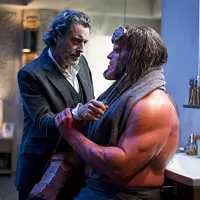

INSIDE LLEWYN DAVIS
****
DIRECTED BY Joel & Ethan Coen
STARS Oscar Isaac, Carey Mulligan
Meet Llewyn Davis, the protagonist of what turned out to be the best film of 2013. As superbly played by Oscar Isaac, he's a folk singer in 1961 New York who's just waiting for that big break, the one that will allow him to finally stop having to sleep couch-to-couch and further enable him to buy a winter coat all his own. In the hands of most filmmakers, Llewyn would experience the usual Tinseltown trajectory: Nice kid struggles, finally makes it big, develops an off-putting ego, suffers a great fall, and emerges from the whole experience wiser and humbler. But in the hands of Joel and Ethan Coen, that's not exactly the way it goes. In Inside Llewyn Davis, there's a lot of career flatlining, and the nice kid is nowhere to be found.
Presumably, Llewyn was nicer before our film begins. At that point, he was half of a musical act (Timlin & Davis), but that partnership only lasted one album due to Mike Timlin committing suicide by jumping off the George Washington Bridge. The spirit of Timlin hangs over many of the characters in the film ("I miss Mike," states one of them plaintively), none more so than Llewyn. While others try to fit him into aural ensembles, he feels he has what it takes to be a solo star, and he presses forward in that capacity. It's not easy, of course: While he manages an occasional gig here and there at Greenwich Village's Gaslight cafe, lack of funds forces him to record a novelty song (the delightful "Please Mr. Kennedy") with his friend Jim (Justin Timberlake) and an amiable fellow named Al Cody (Adam Driver). His determination even leads him to embark on an odyssey to Chicago to meet influential club owner and music maven Bud Grossman (F. Murray Abraham); to get there, he hitches a ride with cane-wielding blowhard Roland Turner (John Goodman, worthy of the Best Supporting Actor Oscar) and his driver Johnny Five (Garrett Hedlund, on the road again following his turn as Dean Moriarty in 2012's On the Road).
Matters aren't much better on the personal front. In addition to his homeless status, he also has to contend with the unexpected pregnancy of Jim's wife Jean (Carey Mulligan, breaking her string of miscasting cues with a wonderfully tart turn), with whom he recently had an affair. Not knowing whether the baby is Llewyn's or Jim's — Llewyn insists the condom must have been defective — Jean is furious, since she would want to keep Jim's child but not Llewyn's. "You're the opposite of King Midas," she bellows. "Everything you touch turns to shit!" Accepting responsibility, our hapless hero tries to borrow money for the abortion ... from the clueless Jim. Classy move, that!
The whole battle over The Wolf of Wall Street has been unfortunately painted as between those who feel the movie is condoning the behavior of Jordan Belfort and those who believe it's not. The conversation has sidestepped those of us in the middle: We aren't as enraptured with Martin Scorsese's movie not because Belfort is a bad man but because he's an uninteresting one. Despite Leonardo DiCaprio's ferocious performance, I found little of interest in the one-note character. That's not the case with Llewyn Davis, who, while nowhere near the level of slime as Belfort, remains a compelling jerk almost from first frame to last, with only a few flashes of decency scattered throughout the film like snowflakes that don't stick.
Like many Coen concoctions, Inside Llewyn Davis is a take-it-or-leave-it effort; in fact, head to the Internet and you'll drown in message boards titled "boring" (or, to really hammer home the point, one tagged "boring, boring, long and boring"). Yet as with many works from great filmmakers, how much you invest in the movie may determine how much you derive from it. In the same manner as No Country for Old Men and A Serious Man, the dynamic duo is offering plenty of food for thought. Are all of Llewyn's problems self-inflicted — the condescension of a man who sneers at the bourgeois stability of those who aid him, the vanity of a musician who demands to be front and center — or could it be that the music world is leaving his brand of traditionalism behind? Is the road trip to Chicago simply filler material (as detractors contend, presumably with a straight face) or does it place Llewyn in a vehicle with two characters who might portend his own fortunes (both jazzman Roland Turner and poet Johnny Five have been emasculated, although we don't know if either was ever as talented as Llewyn). And does anyone really think it's a coincidence that the name of a key player, an orange tabby, is ____? (Sorry, too big a spoiler to reveal here!)
Ah, yes, the cat. A running gag throughout the film is Llewyn's inability to keep track of a feline that's in his care, and these sequences provide the movie with many of its best moments. While these are mostly humorous, there's one bit that's heartrending, and even this interlude can be interpreted as heavy with meaning. At any rate, the cat is a screen natural, and he registers as the best animal act of 2013 — yes, even more than James Franco in Spring Breakers.
Go here for a look at the Best & Worst Movies of 2013.

